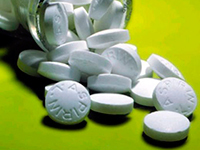Aspirin marks 115th birthday
A little over a hundred years ago, there were no drugs to fight "fever," as most diseases were referred to at that time. In 1763, priest Edward Stone discovered that a decoction of willow bark had a powerful antipyretic effect. Incidentally, two thousand years earlier a similar effect was noted by legendary Hippocrates. And finally, on March 6, 1899, German chemist Felix Hoffmann of Bayer's patented aspirin.

Only half a century after Stone's discovery, scientists were able to determine the chemical composition of salicylic acid. However, at the time salicylic acid did not find practical application. Salicin was not as cheap as products made from natural ingredients. A more affordable salicylic acid was less effective and harmed patients' gastrointestinal tract.
As it often happens in science, an accident came in handy. In 1888, the chemical research laboratory of a prosperous paint company Bayer was visited by a son of a German industrialist, graduate of the prestigious University of Munich Felix Hoffman, who got involved in the synthesis of acetylsalicylic acid.
The young chemist's initiative was not met with enthusiasm at first, and the company leadership did not believe in real benefits of Hoffman's work. The young man had self-interest in this study. Hoffman's father suffered from rheumatism, and salicylic acid could not be used due to stomach problems. On August 10, 1897 Hoffman first discovered acetylsalicylic acid.
Eleven days later he made another discovery in this area: diacetylmorphine, semisynthetic opiate later known as heroin. It was supposed to be used as a stronger painkiller than previously obtained acetylsalicylic acid.
Six months later, the discoveries were registered with unique trademarks. The word "heroin" was derived from "heroic." "Aspirin" was derived from two words, "a" for acetyl and "spirin" for Spiraea.
The wide range of therapeutic characteristics and wide distribution of aspirin is a reason to consider it one of the most important drugs of the twentieth century. Now every year over 50 million packages of aspirin are used on the planet.
Englishmen take it in powder form; Americans prefer effervescent pills, and the French - suppositories. Inexpensive, effective and almost harmless drug has spread rapidly throughout the civilized world, and in no time became the most popular anti-inflammatory, analgesic and antipyretic drug.
What does "almost harmless" mean? Over 115 years, experts had plenty of time to fully explore the side effects of aspirin. Doctors came to the conclusion that this excellent drug, like any other drugs, has to be taken with caution.
For example, doctors strongly recommend against giving it to children under 12. The drug is a blood thinner (this is a godsend for the prevention of heart attack and thrombosis). If for older generations this property may be useful, in children the medicine may cause bleeding.
Those suffering from gastric ulcer, chronic gastritis, as well as allergies, asthma, hypertension crisis, severe chronic liver disease and kidney failure, circulatory disorders should be very careful with aspirin. Aspirin is not recommended for women with menstrual irregularities with significant blood losses.
Aspirin overdose poses a serious threat. Scientists have found that salicylic acid (aspirin transformation product) used for a long period of time in large quantities remains partly in the free state and may cause severe intoxication.
Many people with individual hypersensitivity to the drug may show symptoms of poisoning after ingestion of small doses of aspirin. They include headache, drowsiness, confusion, and tinnitus. A large dose may cause liver malfunction (especially in those who suffer from systemic rheumatic diseases), and kidney problems. Fortunately, these issues are fully reversible when the medication is discontinued.
While this "old-timer" with a great reputation is freely available in any pharmacy, do consult your doctor before taking it, or at least carefully read the instructions.
Subscribe to Pravda.Ru Telegram channel, Facebook, RSS!

